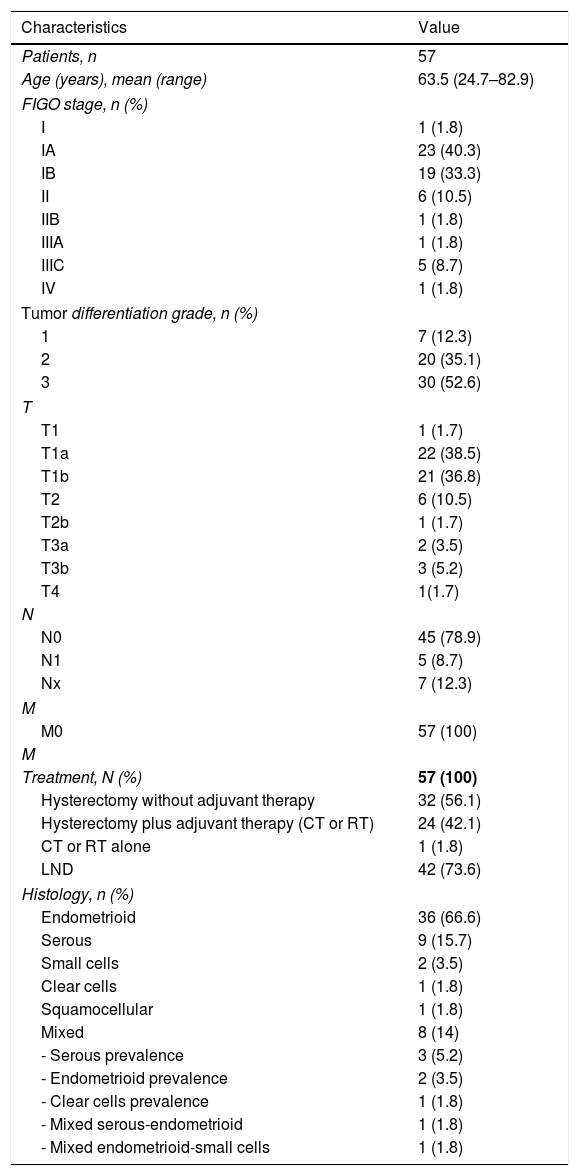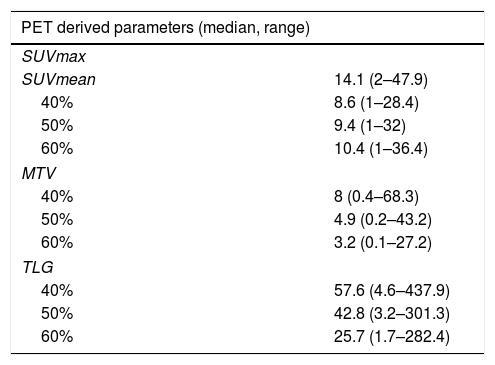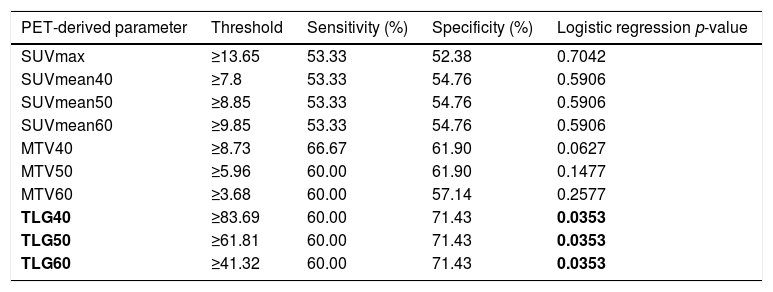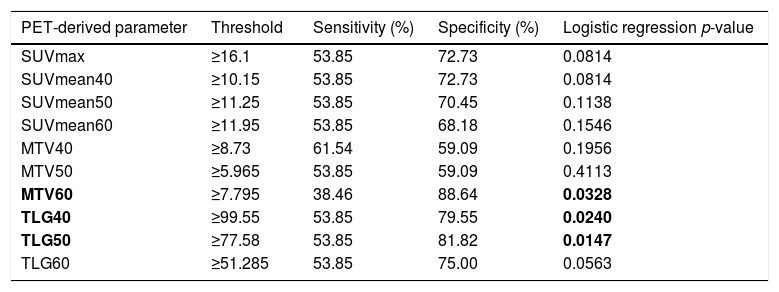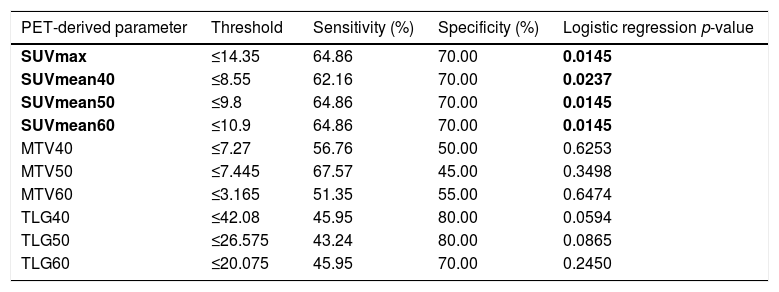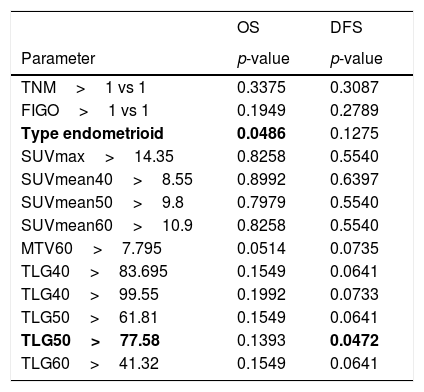To investigate the preoperative prognostic role of 18F-FDG PET/CT in patients with endometrial carcinoma (EC).
Methods18F-FDG PET/CT was performed in 57 patients for EC preoperative staging. Maximum and mean standardized uptake values (SUVmax, mean), metabolic tumor volume (MTV) and total lesion glycolysis (TLG) of primary tumors, at different thresholds of 40%, 50%, 60% (40–50–60), were evaluated and compared with anatomopathological features. The diagnostic performance of PET-parameters (categorized by ROC analysis) in discriminating low-intermediate and high-risk disease and the prognostic role on survival (overall survival –OS; disease free survival – DFS) was evaluated.
ResultsThe categorized TLG40–50–60 were the only parameters related to FIGO stage I versus II-III-IV (p=0.0035 for all). The cut-off values for risk stratification were 83.69, 61.81 and 41.32, respectively (sensitivity: 60.00%; specificity; 71.43% for all parameters). Pathological stage 1 (pT1) of the primary tumor was predicted by MTV60 and TLG40-50 (p=0.0328, 0.0240, 0.0147, respectively). The optimal thresholds were 7.795, 99.55 and 77.58, respectively (sensitivity: 38.46%, 53.85% and 53.85%, respectively; specificity: 88.64%, 79.55% and 81.82%, respectively). SUVmax and SUVmean40–50–60 were the only parameters discriminating endometrioid from non-endometrioid subtype. The corresponding sensitivity was 64.86% and 62.16% for SUVmax and SUVmean 50–60 and 62.16% for SUVmean40; specificity was 70.00% for all parameters. The mean (SD) OS was 79.77% (3.34%) and the mean DFS was 77.89% (3.73%). The tumor type was the only variable significantly associated with OS (p=0.0486). TLG50>77.58cm3 was the only variable associated with a higher risk of relapse (p=0.0472).
ConclusionTLG40–50–60 and MTV60 of primary EC have prognostic value in discriminating FIGO and pathological staging. These results suggest a possible role of these parameters in predicting EC aggressiveness, thus improving the preoperative characterization of endometrial cancer.
Investigar el papel pronóstico preoperatorio de la PET/TC con 18F-FDG en pacientes con carcinoma de endometrio (CE).
Material y métodosSe realizó PET/TC con 18F-FDG en 57 pacientes para el estudio preoperatorio del CE. Se evaluaron los valores de captación estandarizados máximos y medios (SUVmax, media), volumen tumoral metabólico (MTV) y glicólisis de lesión total (TLG) de tumores primarios, a diferentes umbrales de 40%, 50%, 60% (40-50-60), comparándose con las características anatomopatológicas. Se evaluó el rendimiento diagnóstico de los parámetros PET (categorizados por análisis ROC) en la discriminación de la enfermedad de bajo y mediano riesgo y el papel pronóstico en la supervivencia (supervivencia global -OS, supervivencia libre de enfermedad- SSE).
ResultadosLos TLG40-50-60 categorizados fueron los únicos parámetros relacionados con FIGO estadio I versus II-III-IV (p=0,0035 para todos). Los puntos de corte para la estratificación del riesgo fueron 83,69, 61,81 y 41,32, respectivamente (sensibilidad: 60%; especificidad, 71,43% para todos los parámetros. El estadio patológico 1 (pT1) del tumor primario se predijo con MTV60 y TLG40-50 (p=0,0328, 0,0240 y 0,0147, respectivamente). Los umbrales óptimos fueron 7,795, 99,55 y 77,58, respectivamente (sensibilidad: 38,46%, 53,85% y 53,85%, respectivamente; especificidad: 88,64%, 79,55% y 81,82%, respectivamente). SUVmax y SUVmean40-50-60 fueron los únicos parámetros que discriminaron el subtipo endometrioide del no endometrioide. La sensibilidad fue del 64,86% y 62,16% para SUVmax y SUVmean50-60, y 62,16% para SUVmean40; la especificidad fue del 70% para todos los parámetros. La SG media (DE) fue del 79,77% (3,34%) y la SSE media fue del 77,89% (3,73%). El tipo de tumor fue la única variable significativamente asociada a la SG (p=0,0486). TLG50>77,58cm3 fue la única variable asociada a un mayor riesgo de recaída (p=0,0472).
ConclusiónTLG40-50-60 y MTV60 de EC primaria tienen valor pronóstico para discriminar FIGO y estadificación patológica. Estos resultados sugieren un posible papel de estos parámetros en la predicción de la agresividad de la CE, mejorando así la caracterización preoperatoria del cáncer de endometrio.
Article

Revista Española de Medicina Nuclear e Imagen Molecular (English Edition)







